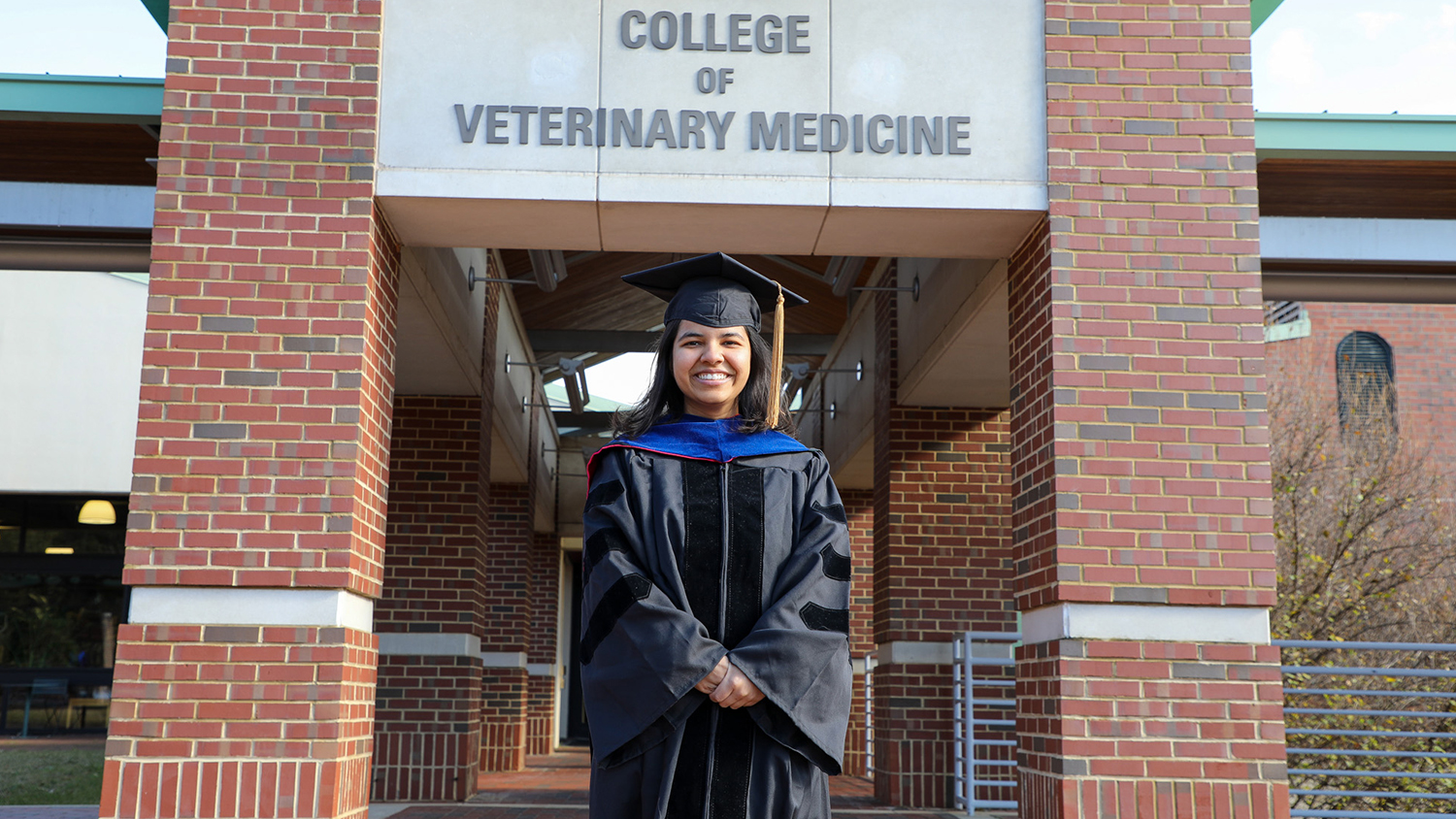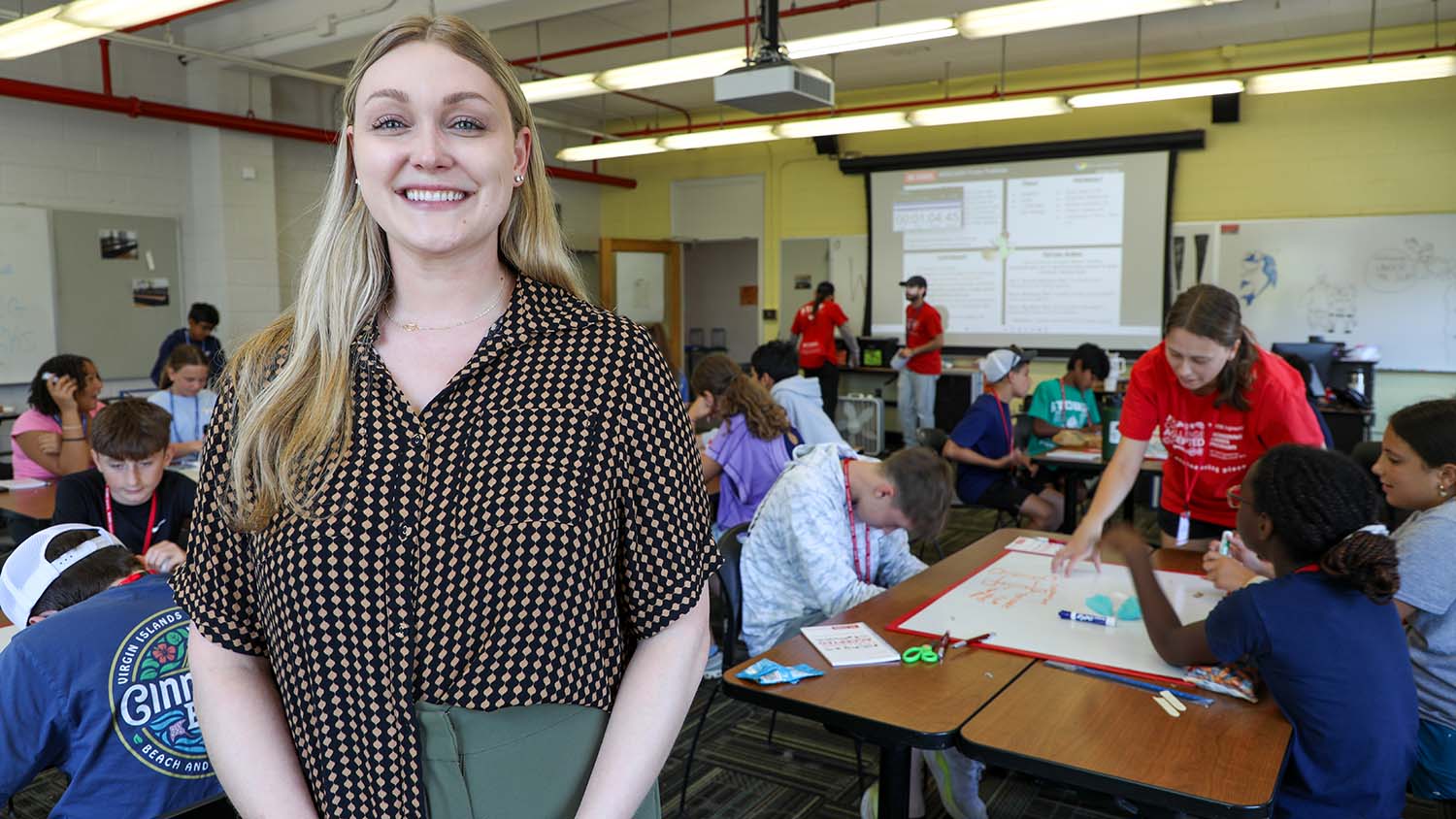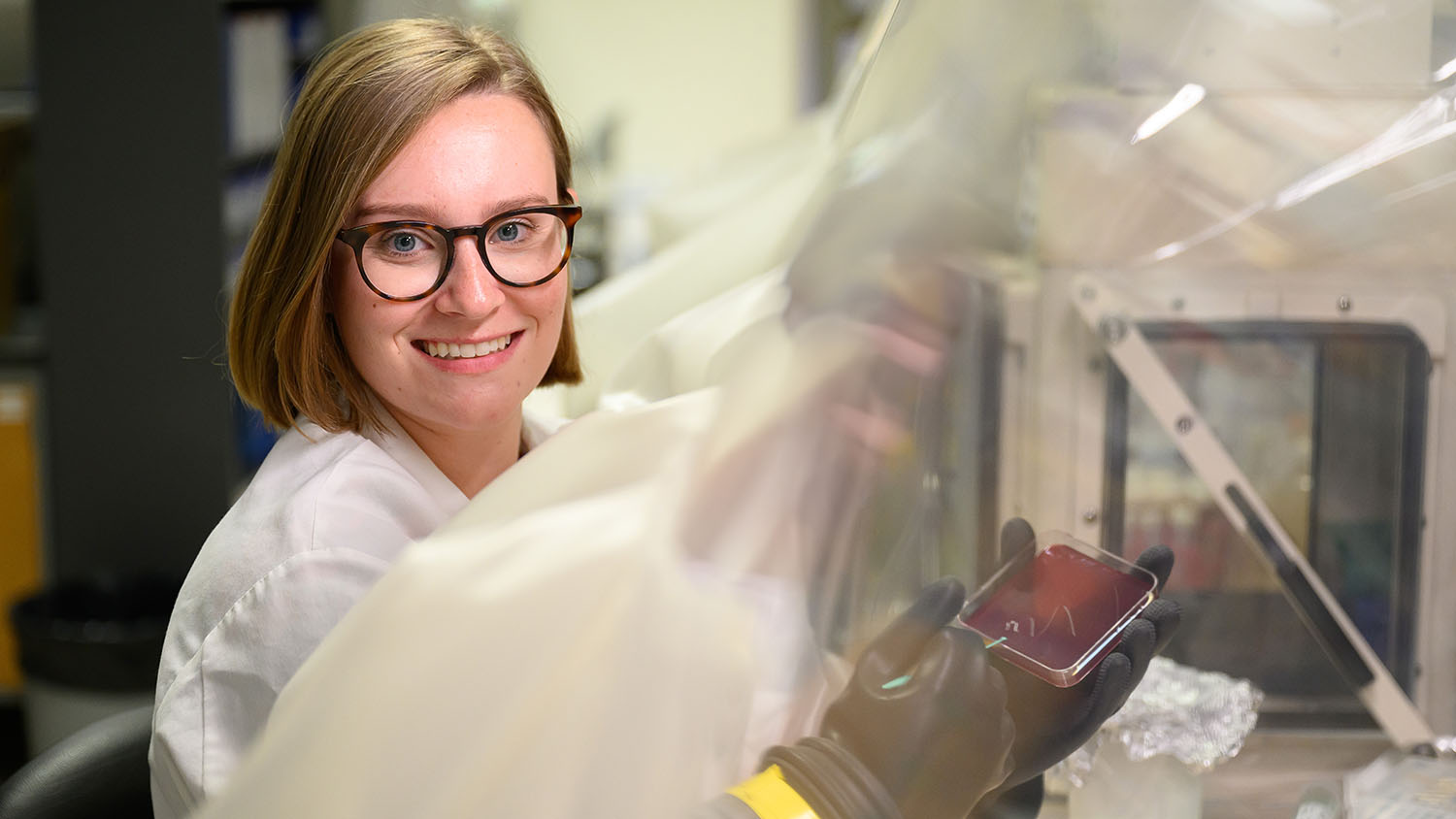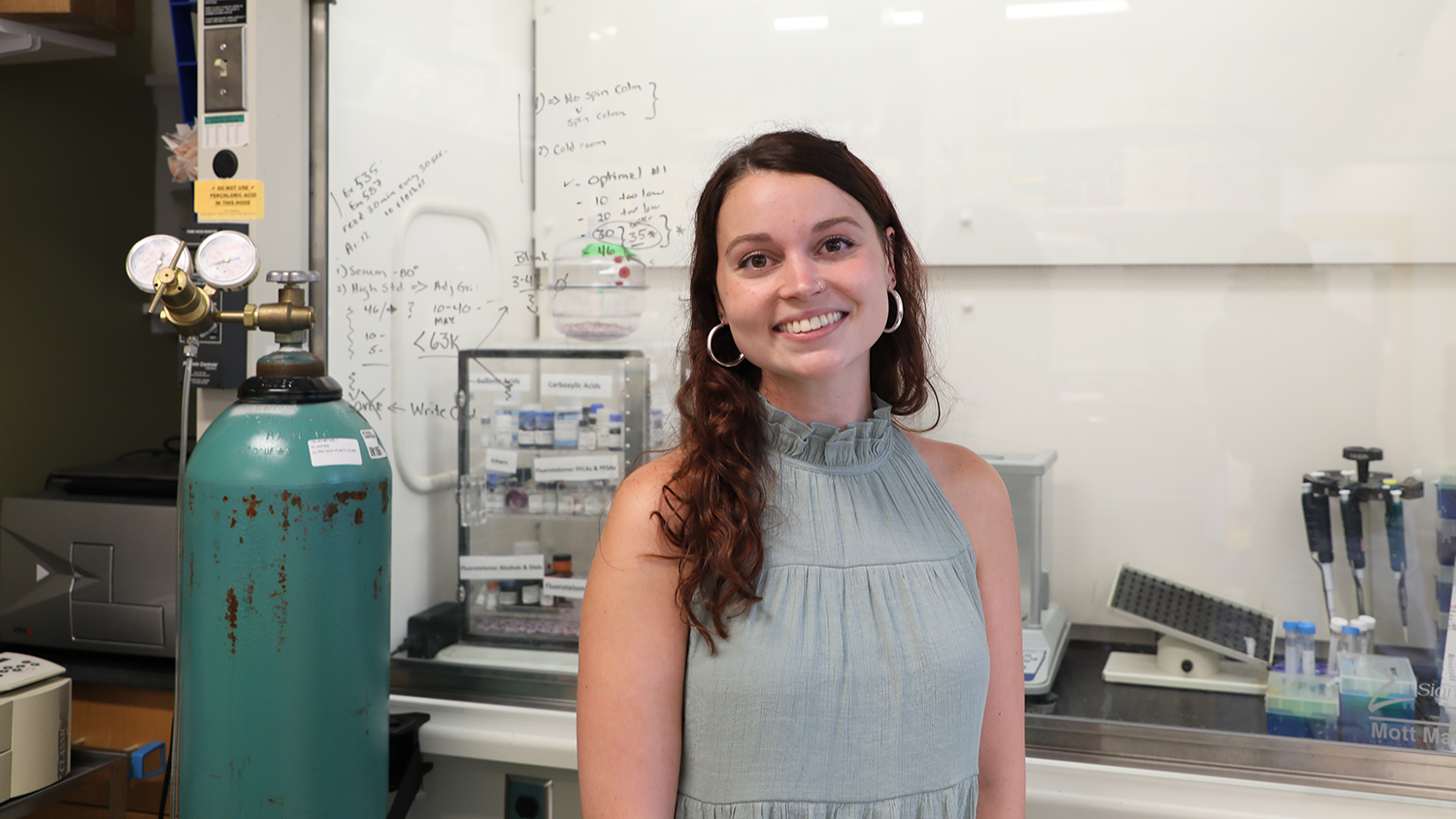Ankita Gupta is a distinguished Fall 2023 Ph.D. graduate in the College of Veterinary Medicine. She is a DVM/Ph.D. student in the Comparative Biomedical Sciences graduate program.
At the core of her passion lies a relentless pursuit of improving the success of translational research for chronic pain, a condition that plagues countless animals and individuals.
The combined DVM/Ph.D. training opportunity at NC State University perfectly fits her clinician-scientist aspirations. At NC State, she is engaged in a globally leading program for veterinary and comparative pain research with strong collaborations with local institutions.
Tell us about your journey to graduate school and what led you to NC State.
My undergraduate experience at Rutgers University helped me realize how much I enjoyed performing research aimed at solving medical problems. Dr. Nicholas Bello, an expert neuroscientist, and physiologist, first introduced me to sensory neurobiology research – specifically taste and olfaction. Under his expert mentorship, I received three prestigious university-level grants and worked on an independent research project investigating the taste sensitivity and preference differences in a transgenic mouse model of autism spectrum disorder. I presented our work at numerous local, national, and international conferences, such as at the University of Sao Pablo in Brazil, completed and defended an undergraduate thesis, and later published my findings as first-author in Physiology and Behavior. This research opportunity gave me first-hand experience working closely with a transgenic rodent model (handling, colony management, genotyping, behavioral experiments, and tissue collection) and a diverse basic science skillset (RNA isolation, qRT-PCR, and IHC). Additionally, it sealed my passion for sensory neurobiology research.
I had always been interested in becoming a veterinarian, so I applied for combined DVM/Ph.D. programs to set a foundation for a future career as a veterinary and comparative clinician-scientist. This research at Rutgers shaped my determination to become a clinician-scientist as 1) It convinced me of my passion for research, 2) I gained insight into how I could combine my love for both clinical veterinary medicine and biomedical research, 3) It initiated my interest in translational medicine using animal models.
Shortly after joining NC State, I learned that the leading veterinary and comparative pain research program was at NC State. After discussing the program with the PI, Dr. Duncan Lascelles, and understanding the extent of his collaborations with basic science faculty and basic and clinical researchers at both UNC Chapel Hill and Duke University, I applied to join his program. Since 2019 I have been co-mentored by Drs. Lascelles (veterinarian and clinician-scientist) and Mishra (an accomplished neurobiologist) working on a trans-disciplinary problem that affects human and animal health.
Tell us about your research and/or teaching experience.
My ongoing innovative predoctoral research focuses on chronic pain and evaluating the role that particular neurotrophic factors play in chronic osteoarthritis (OA) associated pain. My remit is to determine whether or not the neurotrophic factor, artemin, and its signaling system, play an important role in OA pain. My long-term goal is to develop novel, clinically efficacious, and safe therapeutics for human chronic OA pain. I am particularly excited about this research training opportunity which uniquely combines basic molecular pain biology (Mishra) and clinical/translational work using the naturally occurring canine model of OA (Lascelles) – providing me with a truly comparative biomedical training.
The combined DVM/Ph.D. training opportunity at NC State University perfectly fits my clinician-scientist aspirations. At NC State, I am engaged in a globally leading program for veterinary and comparative pain research with strong collaborations with local institutions. I am mentored by experts in molecular pain biology, comparative pain research, and human OA research. I have already experienced that my mentors are demanding but fair; focused on the details of my work but willing to step back and give me independence; dedicated to me receiving a strong training and achieving success while enjoying the experience and taking care of my mental and physical health.
In my Ph.D. training thus far, I have received several stipend awards – the Harold Wetterberg Foundation scholarship, the AVMF Winn Feline Foundation Scholarship, the Zoetis Student Scholarship, the Doc Lombard research award from the International Sled Dog Veterinary Medical Association, and the Comparative Medicine Institute travel award. I have presented abstracts (posters and oral presentations) at local, national, and international conferences and won numerous accolades. I have also published one first-author and one co-first-author manuscript.
At the College of Veterinary Medicine, I have had the opportunity to serve as a student tutor for DVM courses under Dr. Lysa Posner’s mentorship (VMB 933 Introductory Pharmacology, VMP 942 Veterinary Clinical Pathology). I have led over 150 hours of individual and group tutoring sessions for veterinary students. Further, as a Graduate Peer Mentor, direct supervisor to two undergraduate trainees in the Lascelles Lab, and through annual diversity and inclusion training sessions, I have realized the importance of teaching, mentorship, and leadership. These experiences have inspired me to be a committed mentor to future generations of scientists and clinicians. I am excited to inspire and train the next generation of scientists!
How has the Graduate School helped you with your professional development?
The NC State Graduate School and College of Veterinary Medicine have helped me make significant advances toward becoming a productive, independent, NIH-funded, tenure-track clinician-scientist. I am very thankful to have competed and experienced the NC State Graduate School 3MT Thesis competition and the Graduate Student Research Symposium. These experiences have helped me gain strong public speaking and communication skills, make a compelling oral presentation, and understand the value of scientific communication with a non-specialist audience. The College of Veterinary Medicine has also provided me with career counseling and personal financial services that have equipped me with tools to succeed professionally during and after my DVM/Ph.D. training. I am grateful that NC State invests in its students’ mental and physical well-being and professional development!
What does being an NC State graduate student mean to you?
Over the past four years, the NC State Graduate School and the Comparative Biomedical Sciences Graduate Program at the College of Veterinary Medicine have helped me grow as a veterinary student and researcher. NC State has a phenomenal training environment, and I feel supported by all members of this diverse community. NC State has provided me with a world-class education that is preparing me to solve global health challenges and create a healthier world for animals and humans. I am learning and acquiring the skills needed to be an effective leader and clinician-scientist. I am very excited about the innovative research that I am doing and am grateful to the Graduate School for helping me get where I am today!
What are your plans after graduation?
My overarching goal is to become a veterinary clinician scientist in academia, performing high-quality, impactful comparative pain research that contributes to human and veterinary therapeutic development. After completing my DVM/Ph.D. training, I plan to pursue a small animal rotating internship and a surgical residency. I hope to work as a small animal surgeon and researcher at an academic institution.
- Categories:



